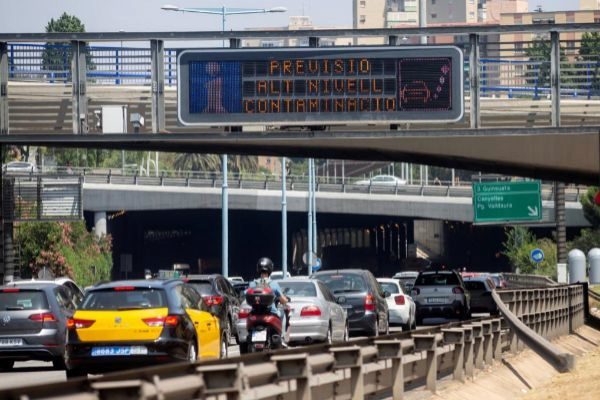Barcelona and four of the surrounding municipalities (L'Hospitalet de Llobregat, Esplugues, Cornellà and Sant Adrià de Besòs) will begin sanctioning polluting vehicles with more than 13 years of age and without a label from April 1, 2020 environmental that circulate from 07.00 to 20.00 hours between Monday and Friday within the area surrounded by the rounds. For practical purposes, it will mean that gasoline models registered before 2000 and diesel before 2006 may not travel during working hours through the city, except for rounds, neighborhoods nestled in the Collserola mountain range and also the Free Zone, the Logistic pole located in the immediate vicinity of the port and the airport.
Although inspections by 70 cameras located at 40 points will begin on January 1, three months of margin will be granted before imposing the first sanctions, pending that the municipalities involved approve the regulations and install the control systems. Fines for cars, motorcycles and vans that violate the restrictions amount to 200 euros , which will be increased to 500 euros to be transgressed on days when an episode of high pollution is declared and will increase up to 30% in case of recidivism.
For large capacity trucks and buses, the penalties will fluctuate between 1,000 and 1,800 euros . However, a one-year moratorium will be applied to vans, trucks and buses to allow time for the fleet to be renewed before 2021, when they will be incorporated into the sanctioning regime. The City Council, which allocates up to 40% of emissions to freight transport, has urged the Government to provide a renewal plan. The Generalitat promises aid for the replacement of industrial prototypes and public transport with the collection of the tax on carbon dioxide of vehicles, effective as of 2020.
Before the reprimands are imposed in April, those who disregard the ban on entering Barcelona will receive notice of the breach. Drivers of affected vehicles may access 10 times a year within the restricted area , on condition that they give notice beforehand through an application. Ambulances, cars for people with reduced mobility and funeral vehicles are exempted from the standard.
The City Council, the Generalitat and the Metropolitan Area of Barcelona extol the measure as the most ambitious to achieve the obligation to reduce pollution by 30% in 15 years and correct the number of deaths believed to be influenced by poor air quality, estimated in 3,749 deaths in the Catalan capital between 2010 and 2018. "We literally play the lives and health of neighbors, especially the most vulnerable, that of our children, the elderly and sick people," emphasized the Mayor Ada Colau, who has listed the traffic limitation as "a turning point that has no reverse."
The City Council estimates that some 50,000 vehicles that now roam the city stop doing so immediately when the reductions take effect. The local government is confident that, in a year, the level of carbon dioxide - which Barcelona has exceeded for two decades - drops 6% and nitrogen oxides, 15%.
The common and socialist executive intends that up to 125,000 vehicles give up moving inside the city in 2024. Barcelona points out that the area where it plans to reduce traffic is 20 times larger than Central Madrid, the contour in the heart of the capital in which prohibitions are established to circulate.
" The vehicle will have less and less space to circulate and public transport, bicycles and walking will be favored. The vehicle will not be so welcome in the city," predicts the deputy mayor of Urban Planning, Janet Sanz. The Colau government - which plans to ratify a regulation in December that will be identical to the four locations in its crown - does not rule out implementing tolls to discourage the use of private vehicles, but believes that 20% of road traffic can be reduced by stimulating transport public, bike lanes and alternatives that pacify traffic within Barcelona, such as the extension of super-islands.
The Metropolitan Area believes that the limitations will entail 140,000 more tickets on public transport. To digest it, plan reinforcements at peak times and provide free parking at the outskirts of Barcelona, from where drivers take trains and buses that connect them to the city.
According to the criteria of The Trust Project
Know more- Barcelona
- Madrid
- Diesel
- Catalonia
CourtsThe Barcelona Prosecutor urges regulation of electric scooters
CataloniaMarlaska believes that security in Barcelona will improve shortly and criticizes the PP
Environment Pollution kills more than 3,700 people in Barcelona since 2010

